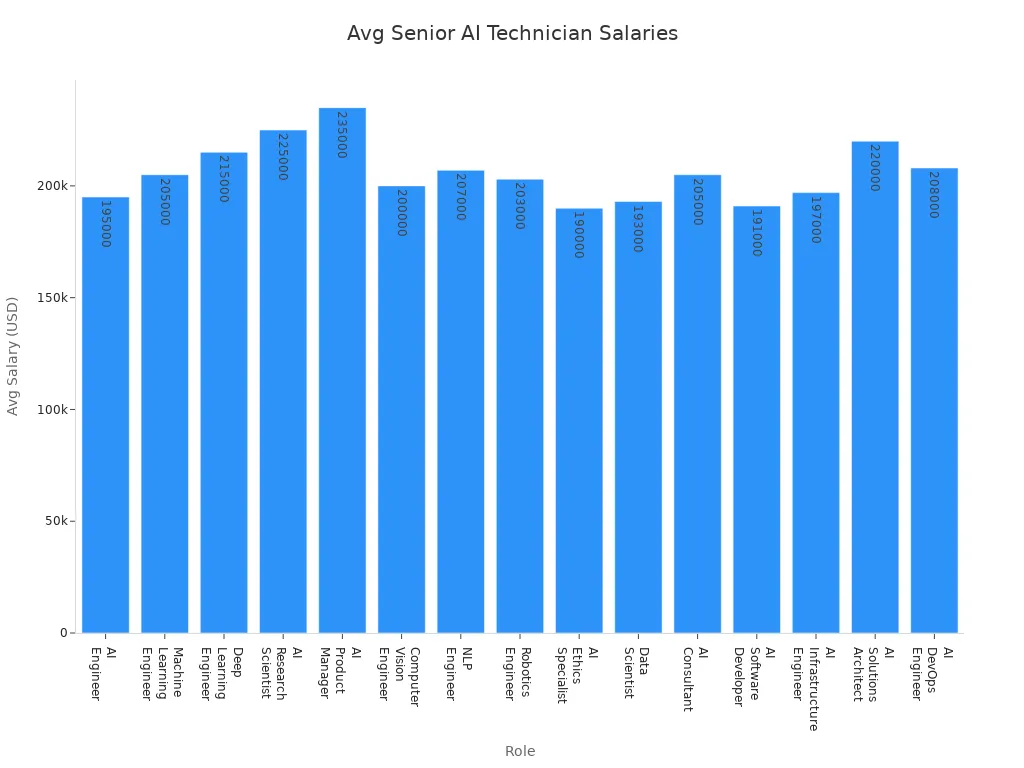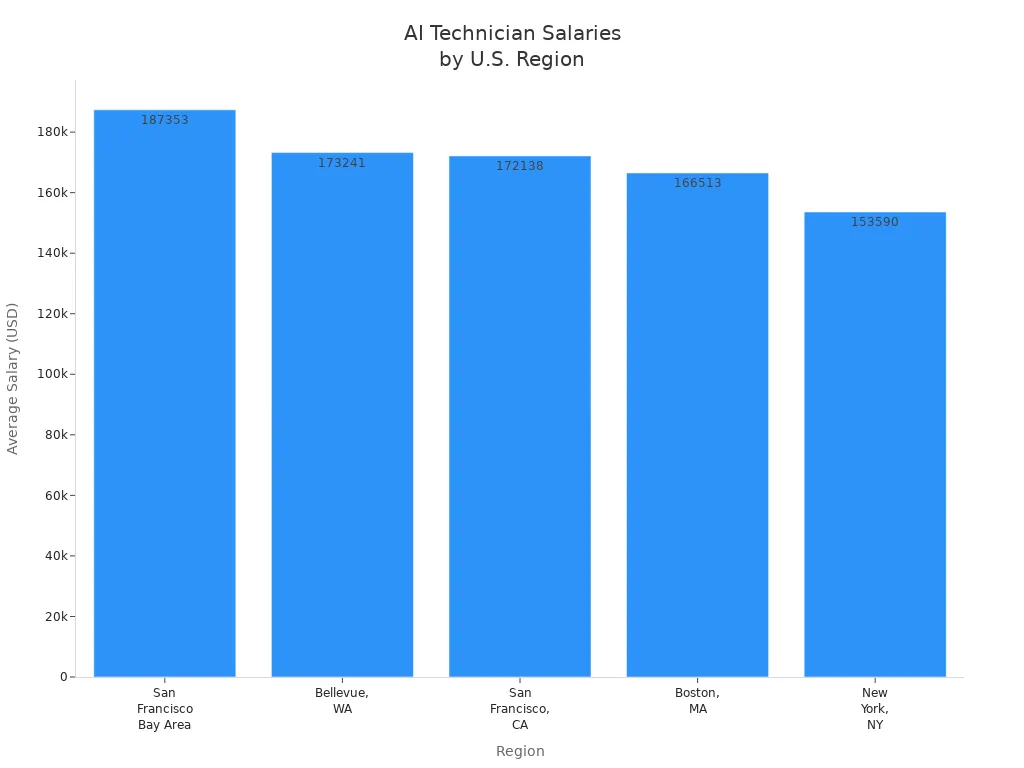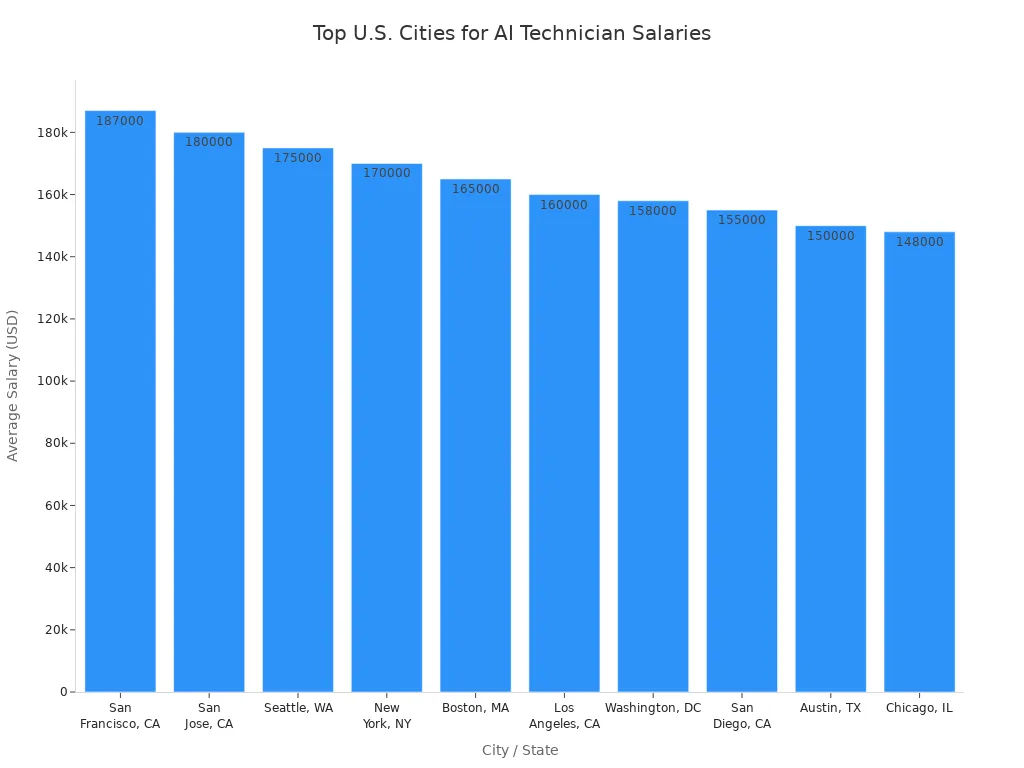Top Skills That Push Your AI Technician Salary Higher

You can expect strong pay when you start your career as an AI technician. The table below shows current entry-level salaries for different roles in the United States:
Role | Entry-Level Salary Range |
|---|---|
Machine Learning Engineer | $90,000 – $110,000 per year |
Data Scientist | $85,000 – $100,000 per year |
AI Research Scientist | $95,000 – $120,000 per year |
AI Engineer | $90,000 – $115,000 per year |
Natural Language Processing | $85,000 – $105,000 per year |
Computer Vision Engineer | $90,000 – $110,000 per year |
Average Entry-Level Salary | $90,000 – $130,000 per year |
Over the past five years, salaries have grown quickly. Experts predict that by 2025, top AI engineers could see total compensation reach over $210,000. The ai technician salary continues to rise as demand for skilled professionals increases.
Key Takeaways
AI technicians can start with strong salaries, often between $90,000 and $130,000 per year, depending on the role and location.
Salaries for experienced AI professionals can exceed $200,000, especially in tech hubs like San Francisco and Seattle.
Continuous learning and gaining new skills can significantly boost your salary and career advancement opportunities.
Certifications in AI and related fields can enhance your job prospects and lead to salary increases of 10% to 25%.
Building a strong portfolio and networking can help you stand out and find better job opportunities in the AI field.
AI Technician Salary

Entry-Level Pay
You can start your career in AI with a strong salary. Many entry-level roles offer pay that is higher than the national average for other tech jobs. Here is a table showing typical entry-level salaries for AI-related positions in the United States:
Role | US Average Salary (Entry-Level) |
|---|---|
AI Engineer | $100,000 – $120,000 |
Software Engineer | $85,000 – $105,000 |
Data Scientist | $90,000 – $110,000 |
DevOps Engineer | $80,000 – $100,000 |
Cloud Engineer | $95,000 – $115,000 |
You can expect an average base salary between $95,000 and $120,000 per year when you begin as an AI technician. If you work in top cities like San Francisco or Seattle, your pay may reach $115,000 to $135,000. Some companies also offer bonuses and equity, which can push your total compensation to $130,000 or even $160,000 in competitive roles.
Tip: If you want to maximize your starting salary, look for jobs in major tech hubs. Cities like San Francisco, Seattle, and Austin often pay more for entry-level AI roles.
Experienced Salary
As you gain experience, your earning potential grows quickly. Senior AI technicians and engineers often earn much more than entry-level workers. Here is a table showing senior-level salaries for different AI roles:
Role | Senior-Level Salary Range |
|---|---|
AI Engineer | $190,000 - $200,000 |
Machine Learning Engineer | $200,000 - $210,000 |
Deep Learning Engineer | $210,000 - $220,000 |
AI Research Scientist | $220,000 - $230,000 |
AI Product Manager | $230,000 - $240,000 |
Computer Vision Engineer | $195,000 - $205,000 |
NLP Engineer | $202,000 - $212,000 |
Robotics Engineer | $198,000 - $208,000 |
AI Ethics Specialist | $185,000 - $195,000 |
Data Scientist | $188,000 - $198,000 |
AI Consultant | $200,000 - $210,000 |
AI Software Developer | $186,000 - $196,000 |
AI Infrastructure Engineer | $192,000 - $202,000 |
AI Solutions Architect | $215,000 - $225,000 |
AI DevOps Engineer | $203,000 - $213,000 |

You can see that the ai technician salary for experienced professionals often reaches $200,000 or more. Some roles, like AI Product Manager or AI Research Scientist, can earn up to $240,000 each year. Your location also affects your pay. For example, working in the San Francisco Bay Area can boost your salary above $187,000. Here is a table showing average salaries in different regions:
Region | Average Salary |
|---|---|
San Francisco Bay Area | $187,353 |
Bellevue, WA | $173,241 |
San Francisco, CA | $172,138 |
Boston, MA | $166,513 |
New York, NY | $153,590 |

Salary Growth
You can expect your ai technician salary to grow as you gain skills and experience. The demand for AI talent keeps rising, so companies compete to offer better pay and benefits. Many employers provide financial incentives like stock options, which let you earn more as the company succeeds. These options usually vest over four years, encouraging you to stay and grow with the company.
Some companies offer immediate cash bonuses or more liquid equity. This helps attract top talent who want faster rewards. For example, OpenAI gives large bonuses to retain skilled workers. These bonuses reflect the high value of AI professionals in today’s market.
Note: Your salary can increase faster if you learn new skills, take on bigger projects, or move to cities with higher pay. The ai technician salary often rises each year, especially if you work for leading tech companies or in regions with strong demand.
You can see that working as an AI technician offers strong financial rewards. Your salary can start high and grow quickly as you advance in your career.
Career Path

Job Titles
You can choose from many job titles as you start your journey in AI. Each title has its own focus and skill requirements. Here is a table showing common job titles and what they mean:
Job Title | Description |
|---|---|
Data Scientist | You analyze data, build models, and use programming to solve problems. |
Machine Learning Engineer | You create algorithms and models, using math and coding skills. |
AI Research Scientist | You study advanced AI topics and often need a PhD. |
AI Application Engineer | You build AI features into software, using strong development skills. |
AI Data Analyst | You work with data to help AI models learn and improve. |
Data Annotation Expert | You label data for training AI systems, which helps supervised learning. |
NLP Expert | You focus on language tasks, using AI and linguistics. |
CV Expert | You work with images and computer vision techniques. |
AI UX Designer | You design user experiences for AI products. |
Multimodal UX Engineer | You create experiences that use sound, images, and text together. |
Startups often use creative job titles, like AI Product Operations Associate or Synthetic Data Labeler. Larger companies prefer standard titles, such as Machine Learning Engineer or Data Scientist.
Advancement
You can move up in your career by gaining experience and learning new skills. Most AI technicians start in junior roles and work toward senior positions. Here is a table showing typical steps for different paths:
Role | Career Progression Steps |
|---|---|
Machine Learning Engineer | Junior ML Engineer → ML Engineer → Senior ML Engineer → ML Engineering Manager → ML Architect → Head of Machine Learning |
Data Scientist | Data Analyst → Junior Data Scientist → Data Scientist → Senior Data Scientist → Lead Data Scientist → Chief Data Scientist |
AI Research Scientist | Research Intern → Research Scientist → Senior Research Scientist → Principal Scientist → Chief Research Scientist |
You need to grow your technical skills and show leadership to advance. You should keep learning about new AI tools and methods. You will also need to manage projects and help your team succeed.
Tip: If you want to reach senior roles, focus on designing complex AI systems and leading teams. Continuous learning helps you stay ahead.
Senior Roles
Senior AI technicians lead teams and manage big projects. You may plan strategies, mentor others, and work with many software platforms. Here is a table showing senior roles and their responsibilities:
Level | Salary Range | Responsibilities |
|---|---|---|
Senior (6-9 years) | $70,000 - $80,000 | You automate complex systems, plan strategies, and guide your team. |
Manager/Director (10+ years) | $85,000 - $100,000+ | You oversee large projects, manage budgets, and drive innovation. |
Many industries hire senior AI technicians, including technology, healthcare, finance, manufacturing, logistics, energy, education, and government. You can expect your ai technician salary to grow as you reach these senior positions.
Skills and Education
Technical Skills
You need strong technical skills to succeed as an AI technician. Employers look for people who understand different types of artificial intelligence and know how to use the right tools. Here are the most in-demand skills:
Types of AI
Machine learning
Deep learning
Neural network architectures
Computer vision
Programming languages
Python
R
Java
C++
Libraries and frameworks
TensorFlow
NumPy
SciPy
Scikit-learn
PyTorch
Apache Spark
Tip: You can practice these skills by building small projects or solving coding challenges. Employers often test your problem-solving abilities with real-world scenarios and timed assessments.
Education
Most AI technicians start with a degree in computer science or a related field. You can see the most common educational backgrounds in the table below:
Educational Background | Percentage |
|---|---|
Computer Science | 28% |
Computer and Informational Sciences | 14% |
You usually need at least a bachelor's degree to get an entry-level job. If you have an associate or junior position, you might earn about $92,560 per year. Starting salaries for new graduates begin around $55,492 and rise to $60,938 with a few years of experience.
Note: Higher education can help you earn more and move up faster. Many roles require a degree in data science or computer science.
Certifications
Certifications show employers that you understand AI tools and best practices. You can choose from many options, including:
Google Professional Machine Learning Engineer
Microsoft Certified: Azure AI Engineer Associate
IBM AI Engineering Professional Certificate (Coursera)
AWS Certified Machine Learning – Specialty
DeepLearning.AI TensorFlow Developer Certificate
Certified Artificial Intelligence Practitioner (CAIP) by CertNexus
Certifications in cloud computing, cybersecurity, and data management can boost your salary by 10% to 25%. AWS-certified professionals sometimes earn up to $150,000 more each year. Practical experience also matters. People with hands-on skills often earn 15% to 23% above base salaries.
Tip: You can increase your job satisfaction and earnings by earning certifications and building real-world experience.
Salary Factors
Experience
Your experience level plays a big role in how much you earn as an AI technician. As you move from a junior to a senior position, your salary can jump by tens of thousands of dollars. The table below shows how salaries increase at each stage:
Level | Typical Salary Increase |
|---|---|
Junior → Mid | +$46,000 |
Mid → Senior | +$46,000 |
Senior → Lead | +$20,000 |
Lead → Director/VP | +$115,000 |
New graduates can earn up to $131,000, which is even higher than some junior roles.
The salary range gets wider at higher levels. This means your job title, company size, and skills can make a big difference.
Tech companies often pay extra for people with AI experience. Some offer bonuses up to $200,000 for data scientists with machine learning skills.
If you build your skills and take on more responsibility, you can see your pay grow quickly.
Location
Where you work also affects your salary. Some cities pay much more because they have a high demand for AI talent. Here is a table of average salaries in top U.S. cities:
City / State | Average Salary |
|---|---|
San Francisco, CA | $187,000 |
San Jose, CA | $180,000 |
Seattle, WA | $175,000 |
New York, NY | $170,000 |
Boston, MA | $165,000 |
Los Angeles, CA | $160,000 |
Washington, DC | $158,000 |
San Diego, CA | $155,000 |
Austin, TX | $150,000 |
Chicago, IL | $148,000 |

You can earn more if you work in cities like San Francisco or Seattle. These places have many tech companies and a high cost of living, which leads to higher pay.
Industry
The industry you choose can also change your pay. Some industries pay more because they need AI experts to solve complex problems. Here are some key factors that affect your salary:
Top AI and machine learning scientists now earn as much as high-level executives.
The tech industry is changing fast, and companies compete for the best AI talent.
Larger companies usually pay more than startups.
Companies that do well financially can offer bigger salaries and bonuses.
Advanced degrees and certifications help you earn more.
Good negotiating skills can help you get a better offer.
Specialized skills in AI and machine learning can lead to salaries over $1 million for top experts.
The ai technician salary depends on your experience, where you work, and the industry you choose. If you keep learning and growing, you can reach the top pay levels in this exciting field.
Career Growth Tips
Portfolio
You can show your skills by building a strong portfolio. A portfolio helps you stand out when you apply for jobs. You should include projects that use machine learning, data analysis, or computer vision. Try to add code samples, project summaries, and results. Employers like to see real-world examples. You can use GitHub to share your work. If you solve problems or create new tools, describe your process. This shows your ability to think and work with AI.
Tip: Update your portfolio often. Add new projects and skills as you learn them. A fresh portfolio shows you keep up with new technology.
Certifications
Certifications help you prove your knowledge. Many employers look for certified AI technicians. You can earn certificates from Google, Microsoft, AWS, and other big companies. These certificates show you understand important tools and methods.
Benefit Type | Percentage | Description |
|---|---|---|
Confidence to explore new jobs | You gain confidence to apply for new jobs after earning a certification. | |
Job promotions | 63% | Many people get promoted or expect a promotion after certification. |
Salary increases | 32% | You may receive a salary increase, with many raises above 20%. |
"As the tech industry undergoes rapid transformation, particularly with the advent of artificial intelligence, the findings underscore the critical role of IT certification in driving career advancement and organizational innovation." – Dr. Gary Gates, Managing Director, Pearson VUE
Networking
Networking helps you grow your career. You can meet new people and learn about job openings. You should connect with professionals in different industries. This helps you see new ideas and trends. Mentors can guide you and support your journey. A strong network makes you more visible to employers.
Generative AI helps you find organizations that match your interests.
Following companies on professional platforms keeps you updated.
Connecting with people from other fields brings new perspectives.
Mentors offer advice and help you make good choices.
A strong network increases your chances of getting noticed for new roles.
Use ChatGPT to write professional emails and messages.
Send follow-up emails after events to keep in touch.
Tip: Attend industry events and join online groups. You can learn from others and share your own experiences.
You can achieve strong salary growth as an AI technician by focusing on skill development and career planning. Start by assessing your current abilities and learning new AI tools. Pursue certifications and build expertise in cloud computing. Grow your leadership skills and specialize in high-value areas. Over time, you can move into senior roles and maximize your earning potential.
Technical skills
AI integration
Continuous learning
Strategic career planning
Take action now. Explore certifications, build your portfolio, and seek new opportunities in AI.
FAQ
What skills help you earn a higher AI technician salary?
You boost your salary by learning Python, machine learning, and cloud computing. Certifications from AWS, Google, or Microsoft also help. Employers value hands-on experience with real projects.
Do you need a degree to become an AI technician?
Most companies want you to have a bachelor’s degree in computer science or a related field. Some entry-level jobs accept associate degrees if you show strong technical skills.
Which cities pay the most for AI technician jobs?
San Francisco, Seattle, and New York offer the highest salaries. Tech hubs pay more because they need skilled AI professionals. You can earn more if you work in these cities.
How fast can your salary grow in this field?
You see salary growth each year as you gain experience. Promotions and new skills lead to bigger paychecks. Some senior roles double your starting salary in five years.
What certifications should you get for AI careers?
You should consider AWS Certified Machine Learning, Google Professional Machine Learning Engineer, and Microsoft Azure AI Engineer Associate. These certifications show employers you understand important AI tools and methods.
See Also
Vending Machine Engineers: Merging Mechanical Skills With Software Knowledge
Launching a Low-Cost AI-Driven Convenience Store Successfully
Modern Retail Advantages of AI-Enhanced Combo Vending Machines
Understanding Industry Verticals and Their Impact on Market Expansion
Boosting Office Efficiency Through Intelligent Vending Machine Solutions
